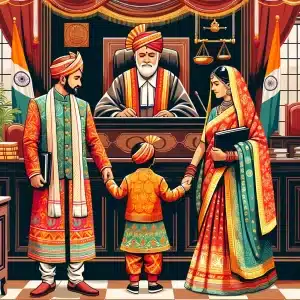Simplifying Your Life & Law | Legal Drafting services

Have we ever thought of what happens to a Hindu’s property once he dies? Where will the property of this Hindu go if – 1) he has no heirs, 2) dies intestate, 3) has only widow and parents, etc. This article will look into the devolution or what happens to the property of a Hindu male or female after the death under the governing Hindu laws in India.
LAW PRIOR TO THE HINDU SUCCESSION ACT, 1956:
Let us look into the mode of devolution of property of a Hindu that prevailed before the commencement of the Hindu succession act, 1956. But, what are they? There are two main schools of Hindu law whose origin and development were noted in the case of Collector of Madura v. Moottoo Ramalinga. It was given by a judicial committee of the Privy Council. They are Mitakshara and Dayabhaga. For the purpose of devolution of the property, as per Mitakshara school, there are two modes of the devolution of the property after death. Whereas, Dayabhaga recognizes only one mode.
- Mitakshara:
Under this type of school, there are devolution takes place as survivorship and succession. Those properties that are held by the joint Hindu family shall be devolved through the forms of survivorship. Whereas in the case of succession under Mitakshara, the properties which are withheld separately by any person apart from the joint family shall be passed through succession. Let us look into an example to illustrate the same.
Assume that A, B and C are three brothers having joint property as per Mitakshara law. Here, if A dies leaving his brothers behind, then the share in the property shall devolve around the other two brothers and not to any legal heirs. But, let’s assume that A has a separate property of his own and dies leaving behind his son, then the property would get succeeded to A’s son as a legal heir and not to the prevailing brothers.
- Dayabhaga:
Unlike the previous school, Dayabhaga recognized only one type of model discussed under Mitakshara that is succession. It does not provide for survivorship over the joint family property. When it comes to joint family property, Dayabhaga does not allow the survivor to take the share of the dead person; instead, it makes the legal heirs entitled to the share of the dead person as if the heirs will succeed after the death under succession, even if the share of the property is from the joint family property.
They are assuming the above example itself, if A, B and C are three brothers having a joint and single share in the property as per Mitakshara law. Here, if A dies leaving his brothers behind, then the share in the property shall devolve around the legal heirs of A and not among the other two brothers.
HINDU SUCCESSION ACT, 1956
Having seen the laws and the rules relating to the devolution of the property before the enactment of the Hindu Succession act, 1956, let us now look into the provisions relating to the devolution and what happens to the property after the death of a Hindu male or female.
Section 6 of the act deals with the devolution of interest in the coparcenary property of Hindu. Section 6(3) states that when a Hindu dies after the commencement of the act of 1956, then his interest in the joint family property which comes under the Mitakshara law, then such interest will devolve by testamentary succession and not through the survivorship and there will be a presumption that the property has been divided or the partition has been made. In such devolution, the daughter will get the same share as that of a son. The shares of pre-deceased sons and daughters shall devolve around or will be allotted to the children of those pre-deceased sons and daughters. Also, as per the section, the share of these pre-deceased sons and daughters of such a pre-deceased child would be allotted to those pre-deceased children of the pre-deceased son or a pre-deceased daughter, as the case may be.
Section 6B deals with the devolution of interest of a female Hindu through the way of survivorship after her death.
It states that if a female Hindu has any interest in the coparcenary property and has died after the commencement of the Hindu succession act, then hr property shall devolve around the people who were surviving at the time of death and shall not be applicable as per this act. Survivorship shall be applied. The section also denotes that if there is any legal heir or a child of a pre-deceased child, then the interest in the property shall devolve around such child as per intestate succession or the testamentary succession and not as per the survivorship. The section specifies the Karnataka amendment in the year 1990.
One of the important provisions under the Act is Section 8, which deals with general rules relating to the succession of property of male Hindu. It is reiterated as follows
“The property of a male Hindu dying intestate shall devolve as follows,
- Firstly, the property shall devolve upon the heirs, being the relatives specified in class I of the Schedule;
- Then, Secondly, if there is no heir of class I, then upon the heirs, being the relatives specified in class II of the Schedule;
- Thirdly, if there is no heir of any of the two classes, then upon the agnates of the deceased; and
- Lastly, if there is no agnate, then upon the cognates of the deceased”.
Conclusion:
Having seen the above provisions and the laws that existed before the commencement of the Hindu succession act of 1956, the modes of devolution of the property of the Hindu after the death has been made clear. These provisions are very important when it comes to succession and while dealing with a property of a Hindu.
You may also like to read:
-
13 Oct 2021 Know Your LawKidnapping and Abduction
-
26 Jul 2021 Know Your LawHomosexuality, Section 377 of IPC
-
19 Aug 2021 Know Your LawCitizenship laws in India
-
27 Jul 2021 Know Your LawAdoption laws under Hindu Law
-
10 Oct 2021 Legal AffairsSon-in-law has no right in the property of father-in-law
-
29 Sep 2021 Know Your LawHOW TO DEAL WITH FALSE RAPE CASES



